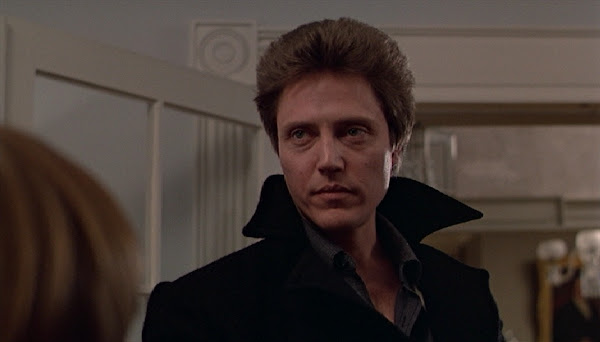
I don't have a whole lot to say about this one. While engaging in a B-movie, 80s horror kind of way, it was far from being a masterpiece. Mainly, it was one small step towards my goal of becoming a Cronenberg completist; Someday soon, I will have seen every single one of this films. This one is more widely available than some others, and it stars a younger Christopher Walken. No Cronenberg movie is ever bad, as long as it bears his combination of subtle and totally un-subtle trademarks. The Dead Zone is plagued by issues shared by many adaptations, in that it seems like the screenwriters couldn't stop themselves from stuffing too much narrative into a feature-length time frame, leaving things kind of under developed.



Despite its few hiccups, the Dead Zone still earns its place in the Cronenberg ouevre. In case you are unaware of the basic premise, it is as follows: Johnny Smith (Christopher Walken) is in a bad car accident, which puts him in a coma. He awakens to discover that he has been unconscious for 5 years, during the course of which, the love of his life has married another man. Since it feels to him like no time has passed at all, this really quite devastating for Johnny. He also discovers that he has psychic abilities; he can see the future. He soon realizes that this is not an immutable future, but once which he has the power to change. The staging of Johnny's visions is really well-done. Cronenberg creates a great visual fusion between Johnny's physical and mental environments.


One of the great things about this story is that no one is remotely dubious of Johnny's newfound clairvoyance. This proves to be really expedient in moving the narrative along. Rather than being forced to contend with naysayers, he has Tom Skerritt's gentle policeman courting him to solve a difficult case, along with many others seeking his preternatural wisdom. Unfortunately, his powers require direct contact, usually in the form of hand-holding, which makes him relatively ineffectual as a detective.


The banality of the supernatural or bizarre in a lot of Cronenberg is one of the things that makes his movies so engaging. While Cronenberg deals in the supernatural, his fondness of extreme possibilities does not transcend our physical world. He explores states of being that have metaphorical significance upon the boundaries of the self, and the interaction of self and environment. His earlier films deal heavily with body horror, a reflection of his own fear of what the body can be subjected to. For instance, he claims that the Fly was about the often ravaging process of aging, while many have concluded that it was an allusion to the AIDS crisis. Cronenberg is an atheist, and morally opposed to representing any kind of afterlife in his movies. (More on all of this can be read here, by the way.) Here, he seems to explore the relationship between the mind and body, as well as well as the separateness of people. While Johnny's psychic powers progress, his body weakens, forcing him to hobble around on a cane. Likewise, without physical contact, he his unable to breach the distance between his mind and another's.



As evidenced by the screen captures, most of the interior scenes are quite lush with detail. When Johnny and Tom Skerrit chase Dodd (Nicholas Campbell), a policeman who moonlights as a rapist, into his room at home, the boyish, cowboy themed decor suggests some kind of arrested development. In the movie's second half, Johnny attempts a return to normalcy by tutoring rather than performing acts of psychic consultation. He is called in to coax a reclusive boy out of his shell. I enjoyed the vision of the boy amidst the technological tableau (below). Houses and rooms are another reflection of the hermetic worlds of those that inhabit them.



This seemingly insular community is populated by duplicitous people. Only Johnny has access to the internal moments that reveal their true natures. The final movement of this piece is the rise of politician Greg Stillson, played by Martin Sheen. (You could reduce this film to a play in which Walken and Sheen face off in their prototypical roles of creep and politician, respectively). While shaking hands with Stillson at a rally, Johnny witnesses a vision of the future in which the reactionary Stillson has become president and has just launched an atomic bomb, purposely bypassing more humane methods of conflict resolution. At this moment, Johnny realizes that, for the good of the world, to save his country from imminent destruction, he must act.

And that's about as far as I could really take it seriously.

Johnny receives this glimpse of the future from Stillson once his mission is complete. Not even waiting to finish his cigarette, Stillson points a gun at himself, splattering blood on a copy of Newsweek that bears an image of him using a baby as a bullet-shield. Incidentally, this happens to be the child of Johnny's former girlfriend.

Johnny essentially martyrs himself, along with his own good name, to save the world. This might have been a decent ending if I thought his character had evolved to a place where this would be realistic. To sum up this movie, I think Johnny's predicament is an interesting vessel to explore human desires-- to know what our sheer biology makes impossible, to transcend the boundaries that separate us, to claim control in a universe that so often seems pitted against us. Interestingly, it is an unpredictable disaster that enables Johnny to see the future. This could be read as entropy or as cosmic design; that maddening dichotomy. Also, it's pretty ironic that the atheistic Cronenberg creates a vigilante Christ figure in Johnny Smith.

Fin.

No comments:
Post a Comment